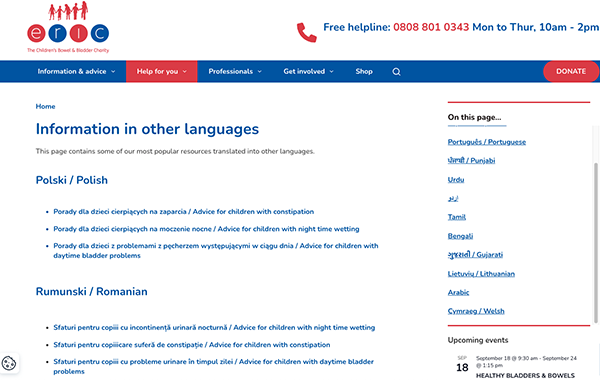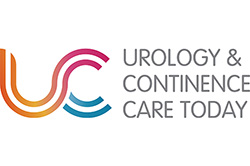Across England and Wales, approximately 4.1 million people (7.1% of the population) speak English as a second language (Office for National Statistics, 2022). Those with limited English proficiency face barriers to accessing healthcare information, are more likely to be in poorer health and have lower employment rates compared with those with strong English skills (Office for National Statistics, 2015).
This is particularly an issue when it comes to bowel and bladder health. Currently 1.5 million children in the UK (1 in 9) suffer from a bowel or bladder issue – that’s higher than the incidence of asthma (Paediatric Continence Forum, 2024). It is vitally important that these families are given the support they need to overcome these issues – including those for whom English is not their first language.
Gaps in children’s continence service provision across the country mean that those in poorer areas (which tend to have a higher prevalence of families speaking English as a second language) may struggle to get support for their child’s bowel or bladder issue. ERIC, The Children’s Bowel & Bladder Charity, is helping to bridge some of these gaps by offering a free helpline and online support for families, so that families across the UK can access evidence-based, clinical advice on the most common childhood bladder and bowel issues.
We quickly realised, however, that there was a strong demand for this information in languages other than English, which is why over the past 2 years we have created an extensive library of bowel and bladder health advice in 12 languages.
Increasing access
Thanks to generous support from Boots Charitable Trust and The Hobson Charity, we have been able to create advice sheets on topics including nighttime wetting, daytime bladder problems, and constipation. The languages in which these are currently available are:
- Polish
- Romanian
- Spanish
- Portuguese
- Punjabi
- Urdu
- Tamil
- Bengali
- Gujarati
- Lithuanian
- Arabic
- Welsh

In seeking to translate our advice sheets, we used data from the most recent UK Census (Office for National Statistics, 2022) to determine the most widely spoken languages. We discovered that Polish, Romanian, Punjabi and Urdu were the most commonly spoken languages other than English, with the largest increase being in Romanian speakers. Even within households, the Census showed a diversity of languages, with 1.5 million households having different main languages within them.
We have also recently added Welsh, since NHS and local authority contacts in Wales are only able to share resources if they are also available in Welsh. We hope that this addition will allow us to reach many more families in Wales who might need support.
We are currently seeking grant funding to continue this project by adding advice on toilet training children with additional needs, which is an area very much in demand at the moment.
The translated advice sheets are available on our website eric.org.uk as web pages and downloadable PDFs, which are ready to print, so healthcare professionals can share them with families – including those without access to the internet.
Why it matters
Our vision is that children and young people everywhere enjoy good bladder and bowel health. Our mission is to get everyone talking about good bladder and bowel health from birth, and taking action that empowers children, young people and their carers with accessible support, information and resources.
We believe that no-one should be excluded from that, including those who speak languages other than English. We want every family to have access to our advice and support on bladder and bowel health, and we hope that this can help not just families, but whole communities, to enjoy healthier, happier lives.
Our accredited helpline, which is free for parents/carers to receive one to one advice, also offers calls in over 200 languages via the interpreting service Language Line, and we offer a BSL service too.
Our aim is to make all our information and advice as accessible as possible, not just for those who speak other languages but also for those with disabilities or those who are neurodiverse. Indeed, people living with a disability or who are neurodiverse are more likely to experience bowel and bladder conditions, so it is essential that this information is made available to them. It's an ongoing project that requires time and resource to achieve but we hope, with the right investment and support over the coming years, that we’ll be able to reach this goal.
What the professionals say
"These advice sheets translations are so useful for those of us who work with families. It's been especially great for an Urdu speaking family we've been supporting recently. We usually offer appointments with a translator, however it was great to be able to give the child's mum further information to take away that she could understand, just like we would for other families. She is engaging with our service and actively asking for advice on treatments, so she was delighted to have some handouts, because ordinarily we very much rely on the translator to communicate. As a multicultural nation it's important that healthcare services recognise those in our community who are non-English speaking and are able to support them."
Jenna Vaughan, Community Specialist Nursing Nursery Nurse
“In the Cumberland region around 67 languages are spoken, with Polish being one of the most prevalent languages spoken by families here. It’s so important to ensure that people feel included and that essential information is accessible for those with children in early years and beyond. ERIC is a vital resource for families and one which we refer people to all the time for toileting information.”
Katie Clarke, Strategic Lead: Early Years and Start for Life Transformation, Cumberland Council
How you can help
ERIC is a small charity with a big impact. Although we have just 24 staff, we cover the whole country – and beyond. Last year we supported over 6417 people via our helpline and received 1.6 million visitors to our website. Our aim is to create a bank of accessible content in a variety of languages and to update our online offering to ensure it meets the needs of those with disabilities and those who are neurodiverse. We’re currently seeking funding for this project and we’re also facing a funding shortfall of around £100,000 now that a big 3-year grant has come to an end.
To find out how you can support us, visit eric.org.uk/fundraise-for-us or, if you’re a healthcare professional who has used our resources please do send us a testimonial about how they’ve helped you – it would be a big support for our grant applications. You can email us at web@eric.org.uk.
Our resources
Families and healthcare professionals can find detailed advice on many bladder and bowel topics on our advice sheets, which include:
- Advice for children with daytime bladder problems: how the bladder works, advice on what to try when there is an issue, and steps to a healthy bladder including checking out the bowel for constipation, looking out for UTIs, working on drinking, and helping children to relax when weeing.
- Advice for children with nighttime wetting: why constipation and daytime bladder problems can cause nighttime wetting, ‘bedtime checklist’ for parents/carers to follow, causes of bedwetting, assessment and treatments.
- Advice for children with constipation: how the bowel works, how things can go wrong, our ‘poo checker’ to identify a child’s stool type, how to spot constipation, treatment, advice about how to help a child sit and relax on the toilet, how to promote a healthy bowel and the impact of a full bowel on the bladder.
- Advice about children’s bladder and bowels – from birth, to potty training, to school: promoting healthy bladder and bowels from birth, introducing and using the potty, advice on sitting and relaxing on the toilet including sensory needs and useful products, taking the step of stopping using nappies, advice for nursery and school, considering nighttime wetting.
- Advice about bladders, bowels and toileting for children with additional needs: where to start with toilet training children with additional needs including older children, constipation, how to promote a healthy bladder including encouraging drinking, advice on extra support such as OT assessments or sensory needs, and advice for those children who are unable to achieve continenc
Visit eric.org.uk to access all of these.
Training for healthcare professionals
Did you know that ERIC also offers online training for healthcare professionals? Our paediatric bowel and bladder nurse specialists offer detailed practical information on all kinds of bowel and bladder issues, including advice on how to tackle them with the families you support.
Upcoming courses for healthcare professionals include:
18th & 24th September 9.30am - 1.15pm, via Zoom
Healthy bladders & bowels
29th September 9.30am - 1.15pm, via Zoom
Nocturnal enuresis
14th October 9.30am - 1.15pm, via Zoom
Toilet training including children with additional needs
16th & 22nd October, 9.30 - 1.15pm, via Zoom
Complex bladders & bowels
4th November 9.30am - 1.15pm, via Zoom
Advanced health bladders & bowels
13th November 9.30am - 1pm, via Zoom
Toilet related anxiety
19th & 26th November 9.30am - 1pm, via Zoom
Interoception and sensory challenges with toileting
Visit eric.org.uk/professionals/health-professionals-training for details. All proceeds from our training courses go back into providing frontline services for families – including creating the advice sheets described in this article - so by attending our courses, you are directly supporting our charitable work.
Upcoming courses for healthcare professionals include:
18th & 24th September 9.30am - 1.15pm, via Zoom
Healthy bladders & bowels
29th September 9.30am - 1.15pm, via Zoom
Nocturnal enuresis
14th October 9.30am - 1.15pm, via Zoom
Toilet training including children with additional needs
16th & 22nd October, 9.30 - 1.15pm, via Zoom
Complex bladders & bowels
4th November 9.30am - 1.15pm, via Zoom
Advanced health bladders & bowels
13th November 9.30am - 1pm, via Zoom
Toilet related anxiety
19th & 26th November 9.30am - 1pm, via Zoom
Interoception and sensory challenges with toileting
Visit eric.org.uk/professionals/health-professionals-training for details. All proceeds from our training courses go back into providing frontline services for families – including creating the advice sheets described in this article - so by attending our courses, you are directly supporting our charitable work.
References
Office for National Statistics (2015) People who cannot speak English well are more likely to be in poor health. https://www.ons.gov.uk/peoplepopulationandcommunity/culturalidentity/language/articles/peoplewhocannotspeakenglishwellaremorelikelytobeinpoorhealth/2015-07-09 (accessed 18 August 2025)
Office for National Statistics (2022) Language, England and Wales: Census 2021. https://www.ons.gov.uk/peoplepopulationandcommunity/culturalidentity/language/bulletins/languageenglandandwales/census2021 (accessed 18 August 2025)
Paediatric Continence Forum (2024) Children’s Continence Commissioning Guide. https://drive.google.com/file/d/1PVroeMlwma4hrI6Uz_dTnGRWRQbdsZSh/view (accessed 18 August 2025)
Office for National Statistics (2022) Language, England and Wales: Census 2021. https://www.ons.gov.uk/peoplepopulationandcommunity/culturalidentity/language/bulletins/languageenglandandwales/census2021 (accessed 18 August 2025)
Paediatric Continence Forum (2024) Children’s Continence Commissioning Guide. https://drive.google.com/file/d/1PVroeMlwma4hrI6Uz_dTnGRWRQbdsZSh/view (accessed 18 August 2025)


